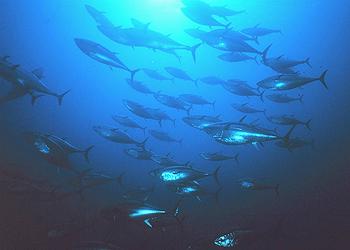
THE HAGUE, The Netherlands, April 25, 2014 (ENS) – The Global Oceans Action Summit for Blue Growth and Food Security concluded today in The Hague with commitments from 80 government ministers, the fishing industry and civil society to tackle key threats to the world’s oceans: climate change, overfishing, habitat loss and pollution.
A joint initiative of the Government of the Netherlands, the UN Food and Agriculture Organization and the World Bank, organizers called the level of cooperation at the four-day meeting one of “unprecedented convergence.”

Summit Chair Sharon Dijksma, the Netherlands agriculture minister, said, “This week the world community has shown courage and boldness in The Hague to move ahead and take action on ocean health and food security.”
“What’s needed now is decisive action from the international community to put solutions into practice.” she said.
Árni Mathiesen, FAO assistant director-general for fisheries and aquaculture, said, “This summit has put an accent on action, and the route to navigate on oceans, fisheries management and aquaculture is much clearer than before.”
World Bank representative Valerie Hickey said, “This summit has presented the way forward for a new type of growth – blue growth which is sustainable, equitable and takes the value of the ocean’s ecosystem services into account.”
“Together, we can restore ocean health at the speed and scale necessary to drive broad-based blue growth, secure food security and turn down the heat on climate change,” said Hickey. “We have the set of actions needed – let’s move on them now.”

More than 10 new commitments for cross-boundary partnering were announced at the summit.
Mauritius, the Seychelles and the Marine Stewardship Council agreed to start work on a certification scheme for specific fish species in the Indian Ocean.
The Rockefeller Foundation and the Netherlands pledged funding support to the FAO and the international, nonprofit research organization WorldFish to produce a Roadmap for the Future of Fish.
A three-part collaboration program between the Ministry of Marine Affairs and Fisheries in Indonesia, the Netherlands Government and Wageningen University was formed to enhance the availability and accessibility of safe fish products and reduction of food waste.
The International Sustainability Unit of the Prince of Wales’ Charitable Foundation launched the development of financing guidelines for fishery recovery.
The summit gathered more than 600 ocean stakeholders, including government 80 ministers from across the world, ocean science experts, business leaders, philanthropists and heads of international organizations.
The summit called for actions focused on improving governance, enhancing sustainable financing, building partnerships for action and sharing knowledge on successful solution implementation.
Participants agreed that the major actions required to bring about blue growth and food security are:
* – A stand-alone Sustainable Development Goal on oceans as part of the post-2015 Development Framework
* – Much stronger recognition of the escalating impacts from climate change on oceans and ensuring ocean health is incorporated into the international processes and events heading towards the 2015 United Nations Framework Convention on Climate Change conference of parties in Paris. This crucial conference is supposed to agree a global, legally-binding treaty to limit greenhouse gas emissions.

* – Eliminating harmful fisheries subsidies that contribute to overfishing and overcapacity and instead incentivizing approaches that improve conservation, build sustainable fisheries and end illegal, unreported and unregulated fishing
* – Strengthening the mandate of Regional Fisheries Management Organisations and their financing and accelerating ratification of agreed mechanisms for improved fisheries practices, better conservation and less pollution, including the Port State Measures Agreement
* – Investing in small and medium scale fisheries and local communities as vital stewards for blue growth and support to sustainable supply chains
* – Building on existing partnerships like the Global Partnership for Oceans, the Global Island Partnership and 50in10 to build global momentum and scale up successes
* – Sharing of knowledge, experiences and solutions through information and communications technology that can enforce and monitor in real time and connect communities globally
Commenting on summit outcome, Dijksma said, “This week the world didn’t just show courage; it showed especially that it’s ready for action to tackle overfishing, climate change and pollution. That is exactly what the world needs right now, as only then will fish and healthy oceans still be able to provide for hundreds of millions of people after 2030.”
Gerald Miles, vice president of global development with Rare, an international U.S.- based conservation organization, said, “The conference brought together a good mix of the new and familiar in terms of both participation and the outcomes.”

“Worth highlighting was the strong recognition of the need for action to help small scale fisheries and communities to address food security, security of tenure and the strengthening of users’ rights to create stronger stewardship of fisheries,” said Miles, who emphasized the value of partnerships for finding and implementing solutions to complex ocean problems.
Rare recently launched the Fish Forever partnership with Environmental Defense Fund and the University of California, Santa Barbara.
Calling it the “first comprehensive, locally-led effort to restore small-scale fisheries,” Rare says the program is designed to boost fish stocks, increase the economic value of fisheries, feed millions of vulnerable people, and provide climate change resilience.
Fishers receive exclusive access to their own designated fishing grounds and are given the support and training to set up fish recovery zones where fish can repopulate away from human pressures, says Rare. Fishers are rewarded when fish populations rebound with help from nearby fish recovery zones.
The Global Oceans Action Summit for Blue Growth and Food Security was co-organized by the World Bank, the FAO and the governments of Grenada, Indonesia, Mauritius, Norway and the United States.
U.S. Secretary of State John Kerry will organize the next summit in June 2014, following up on agreements made this week in The Hague.
Copyright Environment News Service (ENS) 2014. All rights reserved.
© 2014, Environment News Service. All rights reserved. Content may be quoted only with proper attribution and a direct link to the original article. Full reproduction is prohibited.
